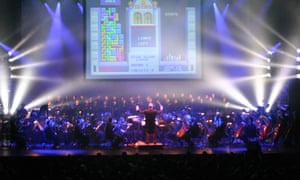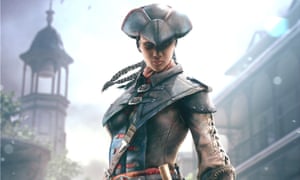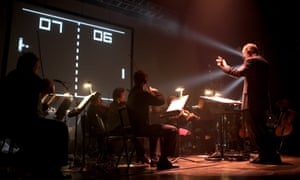
In early 2018, Black Mirror creator Charlie Brooker was a guest on Radio 4’s Desert Island Discs, for which one of his chosen recordings was Jonathan Dunn’s theme for the 1988 Game Boy game RoboCop. In May, the Royal Albert Hall hosted PlayStation in Concert, at which the Royal Philharmonic Orchestra played music from games made for PlayStation consoles from the original in the 1990s through to the current generation. The event was hosted by Jessica Curry, composer for games such as Dear Esther, which recently had its own series of concerts in which a narrator and musicians performed to cues triggered by someone playing the game live on stage.
Video game players love music. Even a track not made for a game can get a boost from association with one; Eminem’s 2002 song Till I Collapse re-entered the UK charts in 2009 after it was used in an advert for Call of Duty: Modern Warfare 2. And music that is composed especially for games finds other outlets, too; a television show called Rich House, Poor House, in which families from opposing ends of the wealth spectrum swap homes for a week, has used music from The Sims, a series of life sim games about the capitalist fantasy of happiness through financial gain.

Game soundtracks have appeal beyond the people who play games, as Curry has found while hosting the video game music show High Score on Classic FM. “It’s been a win on all counts,” she says. “Gamers have really enjoyed hearing the music that they hold so close to their hearts, and it’s also drawn in an entirely new audience of non-gamers who have been impressed and surprised by the quality and variety of the music that is available in the genre. What’s been lovely is that other Classic FM presenters have played music that they’ve heard on High Score on their own shows. There is definitely not only an acceptance of video game music but, I would say, an increasing sense of celebration and pride.”Listen to Journey by Austin Wintory
In 2017, four of the top 20 soundtracks streamed on Spotify were from video games: The Witcher 3: Wild Hunt; Horizon Zero Dawn; The Elder Scrolls V: Skyrim; and Assassin’s Creed Revelations. Horizon Zero Dawn was nominated for a Bafta for its music in 2018, though it lost to Cuphead, a 2D action game inspired by 1930s cartoons with a soundtrack composed by Kristofer Maddigan and performed by a big band, ragtime pianists and a barbershop quartet. Game music has even received recognition at the Grammy awards. The 2010 award for best instrumental arrangement accompanying vocalist(s) went to Christopher Tin’s Baba Yetu, which featured in his 2009 album Calling All Dawns but was originally composed for 2005 strategy game Civilization IV. At the 2013 Grammys, Journey – an interactive expression of the hero’s journey – was nominated for best score soundtrack for visual media for its score composed by Austin Wintory.
Winifred Phillips, a composer known for her work on games such as Assassin’s Creed III: Liberation and the LittleBigPlanet franchise who has won several accoladesfor her compositions, thinks these awards nominations are important “as a way in which to appear on an even playing field with other forms of music composition for entertainment media.” Like music made for television and film, she says, “it’s essentially a form of contemporary classical music, but it has a connection with a more immediate contemporary culture so that it’s more identifiable, accessible to a more mainstream audience”. She says she was surprised but pleased to find that people who might not have thought they would want to listen to a baroque album nevertheless enjoyed the baroque-style music she composed for Assassin’s Creed III: Liberation.

Ken Wong, lead designer of the Escher-inspired puzzle game Monument Valley, neatly summarises on Twitter why people listen to video game music when they’re not actually playing: “I listen to them for the same reasons as I listen to film music: they tell a story, and I often just feel transported to another place. And being wordless means I can still write or do programming.”
Although there are vocalists known for their contributions to video game soundtracks – such as Ashley Lynn Barrett, who has sung for several titles by Supergiant Games (including the song We All Become from science-fiction actionere Transistor, which thus far has been streamed 2,739,457 times on Spotify) – most video game music is wordless. It’s designed as a backdrop for player activity, so it makes sense that people also use it as a backdrop for their real-life work.
“When you’re composing for film and television, you really have to accommodate dialogue, and there’s a lot of foreground material that’s constantly competing for your attention,” says Phillips. “Games are structured so that there are long expanses where there is no dialogue. And music that you create for those sequences, you have the opportunity to really develop musical ideas.”
If the listener has played the game in question, the music can also bring back memories, as Curry explains: “Soundtracks evoke the feeling and emotion that you experienced when you first played a game. Skyrim is a great example of this – it brings back the game so beautifully when you play that soundtrack.” Narrative designer Kait Tremblay, who wrote a “death-positive” game called A Mortician’s Tale, says she uses game soundtracks to set the right tone when writing a scene. One Twitter user liked to use mixes from the fighting series Mortal Kombat as workout jams. Another reported listening to the soundtrack for Dear Esther, a game about walking in the Outer Hebrides … while walking in the Outer Hebrides.

“Film soundtracks are written to accompany an experience that is around an hour and a half long,” says Curry. “Games can be 60 hours, so the emotional investment in the music is immense. It accompanies you on your epic and arduous journey, and is with you from start to finish. Then consider that a theme may have accompanied a player not just for hours, not even for years, but for decades – Zelda, Mario, Final Fantasy – and you begin to understand how deeply those themes and melodies are adored by the players.”
source:-theguardian






